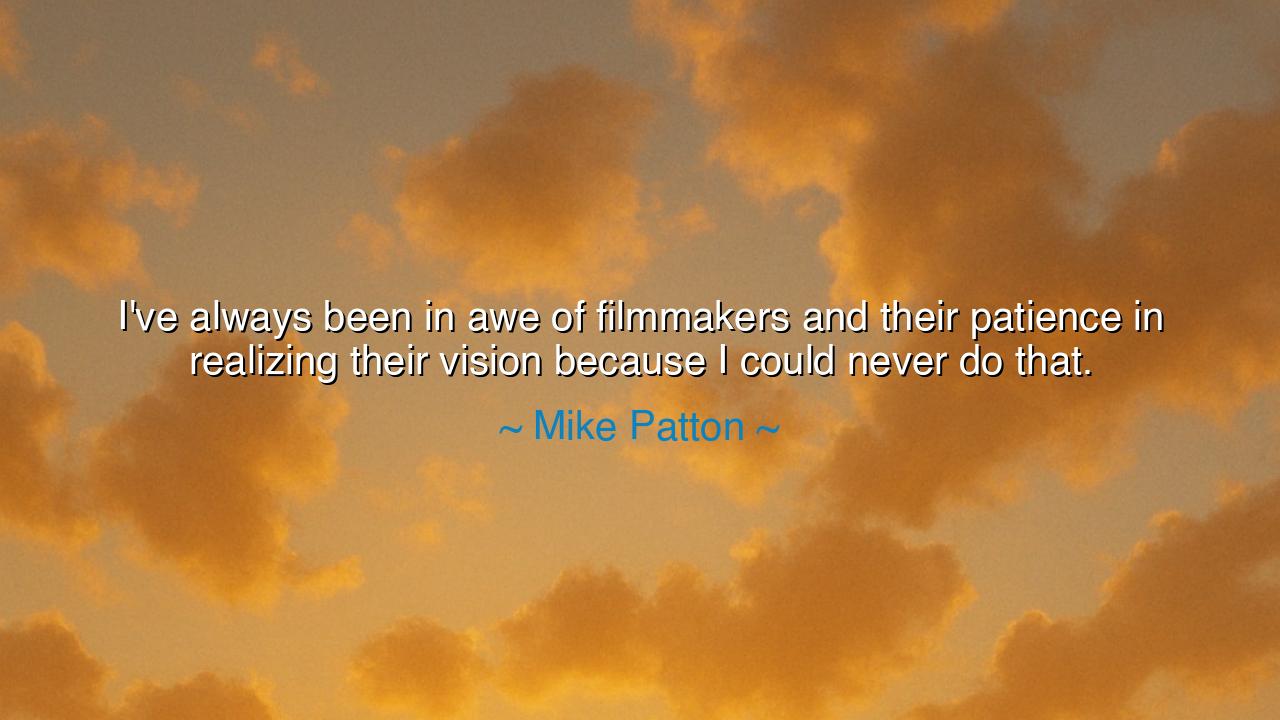
I've always been in awe of filmmakers and their patience in
I've always been in awe of filmmakers and their patience in realizing their vision because I could never do that.






Hear the humble words of Mike Patton: “I’ve always been in awe of filmmakers and their patience in realizing their vision because I could never do that.” These words are not spoken from weakness, but from reverence—reverence for those who dare to hold fast to a dream through years of toil, trial, and delay. They remind us that the creation of great works demands not only talent or inspiration, but endurance, the strength to carry a flame across long nights until it becomes a blazing fire.
The filmmaker is not merely a craftsman of images; they are an architect of worlds, one who gathers fragments of thought and breathes life into them, until shadows on a screen become a living story. To do this requires not only vision, but the unwavering patience to endure endless retakes, shifting schedules, the frailty of human cooperation, and the weight of time itself. Patton confesses he “could never do that,” and in this confession lies a truth: that not all are called to the same path, but each of us may recognize and honor the heroic struggle of others.
History is filled with creators who bore such burdens. Consider the tale of Akira Kurosawa, the great Japanese director. His masterpiece Seven Samurai took years of preparation and a cast of hundreds, filmed under relentless conditions. Studios resisted him, storms delayed him, critics doubted him—yet he endured. The film emerged not as a mere tale, but as a timeless epic that shaped cinema itself. His patience was not passive waiting; it was active perseverance, the refusal to abandon a vision despite endless obstacles. It is this quiet heroism that Patton admires.
In contrast, many of us live in an age of haste, where dreams must be realized quickly or abandoned. The patience of the filmmaker teaches us otherwise—that true creation may require years, even decades, and that greatness does not bloom overnight. Michelangelo spent four years on the ceiling of the Sistine Chapel, straining his body and spirit, yet the work stands eternal. Had he lacked the endurance to continue, the world would be poorer. So too with film: what we see in a few hours of story is the distillation of years of devotion.
Patton’s awe is a lesson in humility. Too often we measure greatness only by what we ourselves achieve. But wisdom lies also in recognizing the struggles of others, in lifting our gaze to honor those whose strengths differ from ours. To say “I could never do that” is not defeat—it is respect. For the world is sustained not by one type of strength, but by many: the quick spark of inspiration, the slow burn of patience, the guiding light of vision.
What, then, shall we learn from this saying? That vision alone is not enough—it must be married to endurance. That patience is not a weakness, but a weapon. And that admiration for others is itself a virtue, teaching us to honor the unseen struggles behind every masterpiece. The films we watch, the art we treasure, the monuments we revere—all are born not only from genius, but from years of persistence we never witness.
Therefore, let us practice patience in our own lives. Begin with small acts: finish the task you are tempted to abandon, return each day to the craft you love, endure the silence before recognition comes. And when you behold the works of others, whether in film, art, or life, do not envy or diminish them—stand in awe, as Mike Patton does, and let their example remind you of the hidden strength of patience.
For in the end, the greatest lesson is this: a vision without patience fades like mist, but a vision carried through hardship becomes eternal. Honor those who endure. Learn from them. And when your own moment of trial arrives, may their example guide you to hold fast until your work, too, shines like fire in the night.






AAdministratorAdministrator
Welcome, honored guests. Please leave a comment, we will respond soon